5 books about 1207-1273
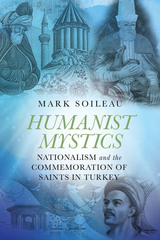
Humanist Mystics
Nationalism and the Commemoration of Saints in Turkey
Mark Soileau
University of Utah Press, 2018
When the Ottoman Empire met its demise in the early twentieth century, the new Republic of Turkey closed down the Sufi orders, rationalizing that they were antimodern. Yet the nascent nation, faced with defining its cultural heritage, soon began to promote the legacies of three Sufi saints: Mevlana Celaleddin Rumi, Hacı Bektaş Veli, and Yunus Emre. Their Turkish ethnicity, along with universalist themes found in their poetry and legends—of love, peace, fellowship, and tolerance—became the focus of their commemoration. With this reinterpretation of their characters—part of a broader secularist project—these saints came to be considered the great Turkish humanists. Their veneration came to play an important role in the nationalist formulation of Turkish culture, but the universalism of their humanism has exposed fissures in society over the place of religion in the nation.
Humanist Mystics is the first book to examine Islam and secularism within Turkish nationalist ideology through the lens of commemorated saints. Soileau surveys Anatolian and Turkish religious and political history as the context for his closer attention to the lives and influence of these three Sufi saints. By comparing premodern hagiographic and scholarly representations with twentieth-century monographs, literary works, artistic media, and commemorative ceremonies, he shows how the saints have been transformed into humanist mystics and how this change has led to debates about their character and relevance.
Humanist Mystics is the first book to examine Islam and secularism within Turkish nationalist ideology through the lens of commemorated saints. Soileau surveys Anatolian and Turkish religious and political history as the context for his closer attention to the lives and influence of these three Sufi saints. By comparing premodern hagiographic and scholarly representations with twentieth-century monographs, literary works, artistic media, and commemorative ceremonies, he shows how the saints have been transformed into humanist mystics and how this change has led to debates about their character and relevance.
[more]
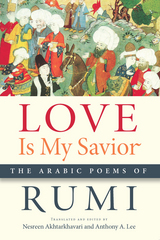
Love Is My Savior
The Arabic Poems of Rumi
Nesreen Rumi
Michigan State University Press, 2016
This new volume of Rumi’s works, the first-ever English translation of his Arabic poems, will be exciting for the newcomer to Rumi’s verses as well as to readers already familiar with his mystical philosophy. The poems take the reader on a journey of spiritual exploration, ecstatic union, cruel rejection, and mystic reconciliation. Rumi reveals his soul and welcomes everyone to his spiritual feast.
This dual-language volume opens a treasury of Rumi’s mystic thought and startling poetry. His verses pulsate with desire and longing, with sensuality, and with ecstatic celebration. Rumi found in his mystic poetry a vehicle for the expression of the endless spiritual bounties of love. He placed love at the center of his faith and doctrine, and he pronounced it to be the goal of his life and the only form of true worship. This collection is stunningly rendered in English by an award-winning poet and a distinguished translator of Arabic poetry.
This dual-language volume opens a treasury of Rumi’s mystic thought and startling poetry. His verses pulsate with desire and longing, with sensuality, and with ecstatic celebration. Rumi found in his mystic poetry a vehicle for the expression of the endless spiritual bounties of love. He placed love at the center of his faith and doctrine, and he pronounced it to be the goal of his life and the only form of true worship. This collection is stunningly rendered in English by an award-winning poet and a distinguished translator of Arabic poetry.
[more]
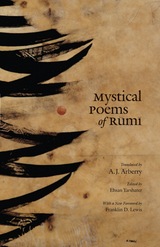
Mystical Poems of Rumi
Jalal al-Din Rumi
University of Chicago Press, 2009
My verse resembles the bread of Egypt—night passes over it, and you cannot eat it any more.
Devour it the moment it is fresh, before the dust settles upon it.
Its place is the warm climate of the heart; in this world it dies of cold.
Like a fish it quivered for an instant on dry land, another moment and you see it is cold.
Even if you eat it imagining it is fresh, it is necessary to conjure up many images.
What you drink is really your own imagination; it is no old tale, my good man.
“Rumi is one of the world’s greatest lyrical poets in any language—as well as probably the most accessible and approachable representative of Islamic civilization for Western students.”—James W. Morris, Oberlin College
Devour it the moment it is fresh, before the dust settles upon it.
Its place is the warm climate of the heart; in this world it dies of cold.
Like a fish it quivered for an instant on dry land, another moment and you see it is cold.
Even if you eat it imagining it is fresh, it is necessary to conjure up many images.
What you drink is really your own imagination; it is no old tale, my good man.
Jalal al-Din Rumi (1207–73), legendary Persian Muslim poet, theologian, and mystic, wrote poems acclaimed through the centuries for their powerful spiritual images and provocative content, which often described Rumi’s love for God in romantic or erotic terms. His vast body of work includes more than three thousand lyrics and odes. This volume includes four hundred poems selected by renowned Rumi scholar A. J. Arberry, who provides here one of the most comprehensive and adept English translations of this enigmatic genius. Mystical Poems is the definitive resource for anyone seeking an introduction to or an enriched understanding of one of the world’s greatest poets.
“Rumi is one of the world’s greatest lyrical poets in any language—as well as probably the most accessible and approachable representative of Islamic civilization for Western students.”—James W. Morris, Oberlin College
[more]
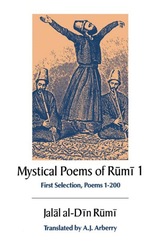
The Mystical Poems of Rumi 1
Jalal al-Din Rumi
University of Chicago Press, 1974
Rumi, who wrote and preached in Persia during the thirteenth century, was inspired by a wandering mystic, or dervish, named Shams al-Din. Rumi's vast body of poetry includes a lengthy poem of religious mysticism, the Mathnavi, and more than three thousand lyrics and odes. A.J. Arberry, who selected four hundred of the lyrics for translation, calls Rumi "one of the world's greatest poets. In profundity of thought, inventiveness of image, and triumphant mastery of language, he stands out as the supreme genius of Islamic mysticism."
"An excellent introduction to Rumi, the greatest mystical poet of Islam. . . . Rumi's scope, like that of all great poets, is universal—reaching from sensuous luxuriance to the driest irony."—Sherman Goldman, East-West Journal
"An excellent introduction to Rumi, the greatest mystical poet of Islam. . . . Rumi's scope, like that of all great poets, is universal—reaching from sensuous luxuriance to the driest irony."—Sherman Goldman, East-West Journal
[more]
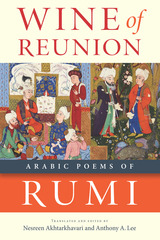
Wine of Reunion
Arabic Poems of Rumi
Nesreen Rumi
Michigan State University Press, 2017
Exciting to those unfamiliar with Rumi’s verse as well as to the veteran scholar, this volume, following on Love Is My Savior, offers more of the little-known Arabic poems of Mawlana Rumi. These poems take the reader on a journey of spiritual search, ecstatic union, universal salvation, and mystic reconciliation, in which Rumi reveals his soul and welcomes everyone to his spiritual feast. This dual-language volume, with its informative introduction, is one of the first to bring Rumi’s Arabic poems into English, and it opens a treasury of Rumi’s mystic thought and electrifying poetry. The poems pulsate with desire and longing, with erotic meaning, and with ecstatic celebration. Rumi found in his mystic poetry a vehicle for the expression of the endless spiritual bounties of love. The reader will find, at the center of his faith and doctrine, love and a strong belief in universal salvation and unlimited generosity.
[more]
READERS
Browse our collection.
PUBLISHERS
See BiblioVault's publisher services.
STUDENT SERVICES
Files for college accessibility offices.
UChicago Accessibility Resources
home | accessibility | search | about | contact us
BiblioVault ® 2001 - 2024
The University of Chicago Press









